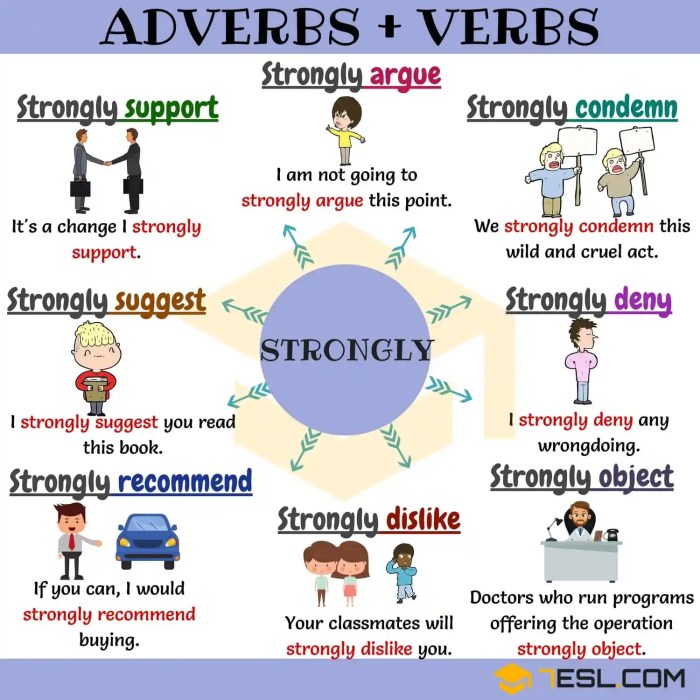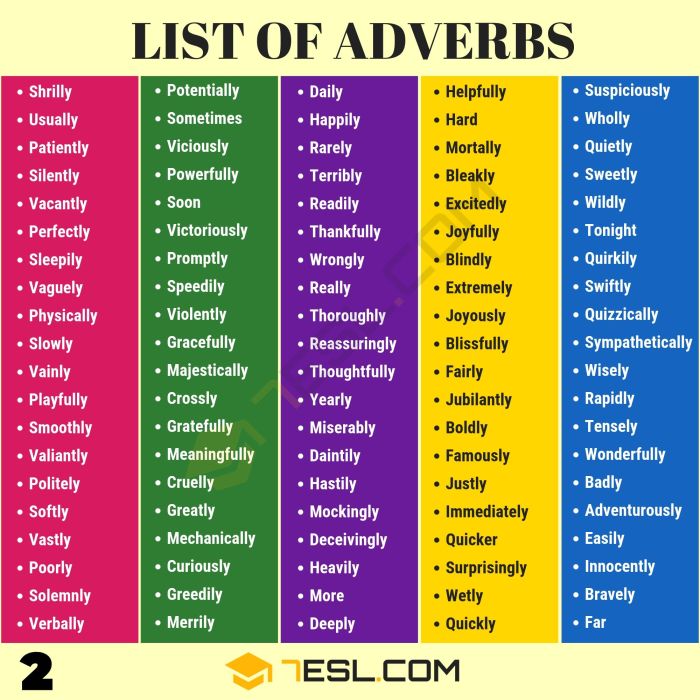Quiz 2 verbs and adverbs – Embark on a captivating journey into the realm of grammar with our Quiz 2: Verbs and Adverbs. This comprehensive guide unveils the secrets of these linguistic building blocks, empowering you to master their usage in quizzes and beyond.
Delve into the intricate world of verbs and adverbs, where their roles in sentences unfold like a symphony. Discover the art of identifying them within quiz questions, unlocking the key to accurate comprehension.
Quiz Overview
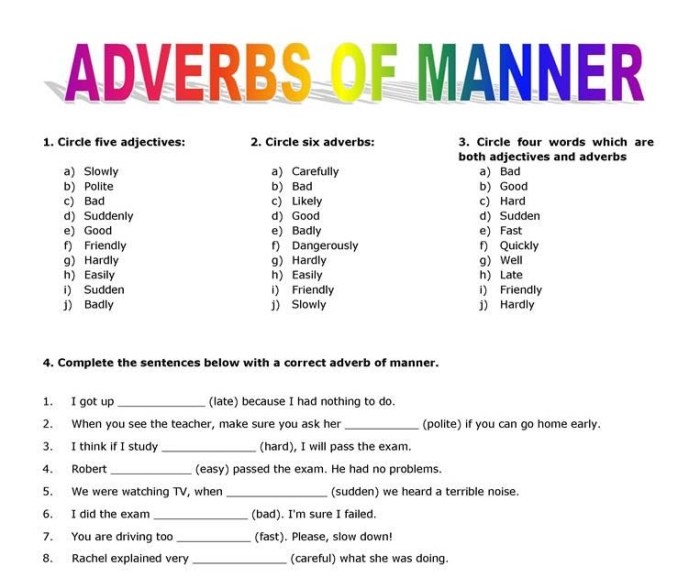
Quizzes are a versatile tool used to assess knowledge and skills in various educational and professional settings. They can be tailored to different levels of difficulty and cover a wide range of subjects, making them suitable for diverse audiences.
Quizzes come in various formats, including multiple-choice questions, true or false statements, fill-in-the-blank questions, short answer questions, and essay questions. Each format has its unique strengths and is appropriate for specific learning objectives.
Types of Quizzes
- Diagnostic Quizzes:Designed to identify areas where students need additional support or reinforcement.
- Formative Quizzes:Used during the learning process to provide feedback and track progress.
- Summative Quizzes:Administered at the end of a unit or course to evaluate overall understanding and achievement.
- Placement Quizzes:Determine students’ readiness for a particular course or program.
- Aptitude Quizzes:Assess individuals’ potential for success in a specific field or role.
Verbs and Adverbs
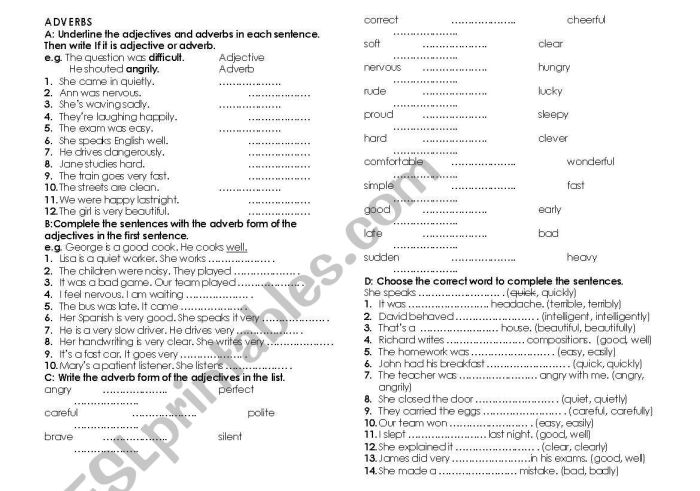
Verbs and adverbs are two important parts of speech that play crucial roles in sentences. Understanding their functions and usage will significantly enhance your writing and communication skills.
Verbs
Verbs are words that describe actions, occurrences, or states of being. They form the backbone of a sentence and convey the main idea or event.
Quiz 2 on verbs and adverbs is coming up soon, so brush up on your knowledge! In the meantime, have you heard about the innovative black foam for wound vac ? It’s a game-changer in wound care. And don’t forget to study hard for Quiz 2 on verbs and adverbs!
- Action verbsexpress physical or mental activities (e.g., run, jump, think, speak).
- Linking verbsconnect the subject to a noun or adjective that describes it (e.g., is, are, was, were).
- Helping verbsassist main verbs by expressing tense, mood, or voice (e.g., have, had, can, could).
Adverbs
Adverbs are words that modify verbs, adjectives, or other adverbs. They provide additional information about how, when, where, or to what extent something is done or described.
- Adverbs of mannerdescribe how something is done (e.g., quickly, slowly, carefully).
- Adverbs of timeindicate when something happens (e.g., now, then, yesterday).
- Adverbs of placeshow where something occurs (e.g., here, there, everywhere).
- Adverbs of degreeexpress the intensity or extent of something (e.g., very, quite, extremely).
Understanding the roles of verbs and adverbs will help you construct grammatically correct and meaningful sentences. By using them effectively, you can add depth and precision to your writing.
Identifying Verbs and Adverbs in Quizzes
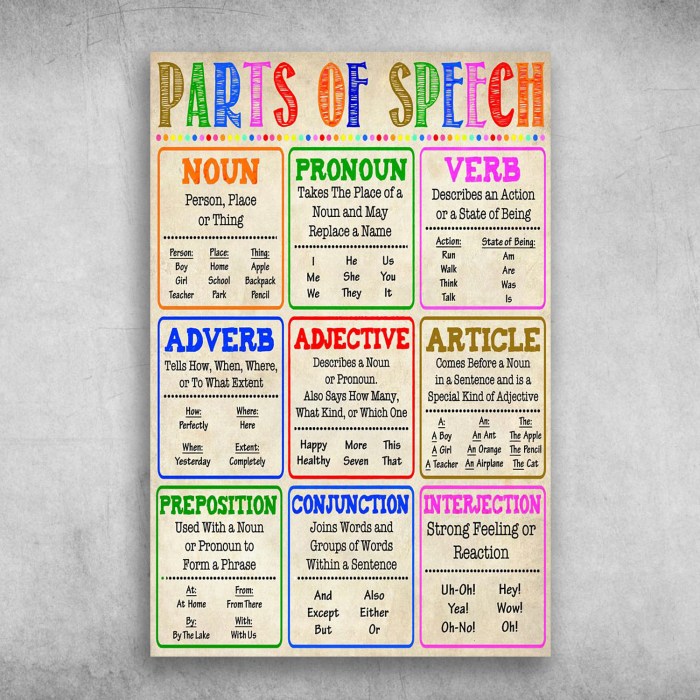
Quizzes often test your ability to identify verbs and adverbs. These parts of speech play crucial roles in sentences, and understanding how to spot them can significantly improve your quiz performance.
Verbs are words that describe actions, states, or occurrences. Adverbs, on the other hand, modify verbs, adjectives, or other adverbs by providing additional information about manner, place, time, or degree.
Strategies for Identifying Verbs and Adverbs
- Look for action words:Verbs typically indicate actions, such as “run,” “jump,” “eat,” or “think.”
- Identify words that describe verbs:Adverbs often provide additional information about verbs, such as “quickly,” “slowly,” “here,” or “now.”
- Check for-ly endings: Many adverbs end in “-ly,” such as “quickly,” “happily,” or “carefully.”
Examples of Verbs and Adverbs in Quiz Contexts, Quiz 2 verbs and adverbs
| Part of Speech | Example | Quiz Context |
|---|---|---|
| Verb | runs | Which verb describes the action of moving quickly? |
| Adverb | quickly | Which adverb modifies the verb “runs”? |
Quiz: Verb and Adverb Identification
- Identify the verb in the following sentence: “The dog chased the ball.”
- Identify the adverb in the following sentence: “The car drove slowly down the road.”
Using Verbs and Adverbs Effectively: Quiz 2 Verbs And Adverbs
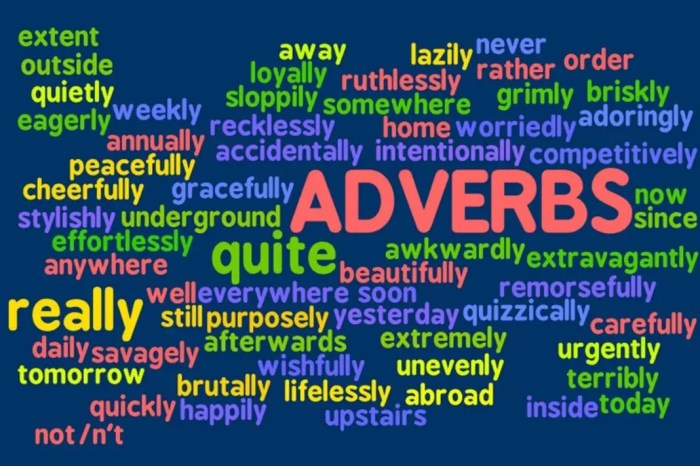
Using verbs and adverbs effectively in quizzes is crucial for creating clear and engaging questions and answers. Verbs convey actions or states of being, while adverbs modify verbs, adjectives, or other adverbs, providing additional information about how, when, where, or to what extent an action is performed.
Strong verbs and adverbs make quizzes more dynamic and informative. They add depth and precision to questions and answers, allowing for a more nuanced understanding of the concepts being tested.
Comparing Strong and Weak Verbs and Adverbs
| Characteristic | Strong Verbs and Adverbs | Weak Verbs and Adverbs |
|---|---|---|
| Meaning | Precise, specific, and descriptive | General, vague, and lacking detail |
| Impact | Create vivid and memorable questions and answers | Can be easily overlooked or forgotten |
| Example | “Analyze” instead of “study””Quickly” instead of “fast” | “Walk” instead of “stride””Good” instead of “excellent” |
FAQ Explained
What is the primary purpose of using verbs in quizzes?
Verbs serve as the backbone of quiz questions, expressing actions, states, or occurrences that form the core of the question.
How can adverbs enhance the quality of quiz questions?
Adverbs provide additional information about verbs, modifying their meaning and adding depth to the question. They can indicate manner, frequency, time, or place.
